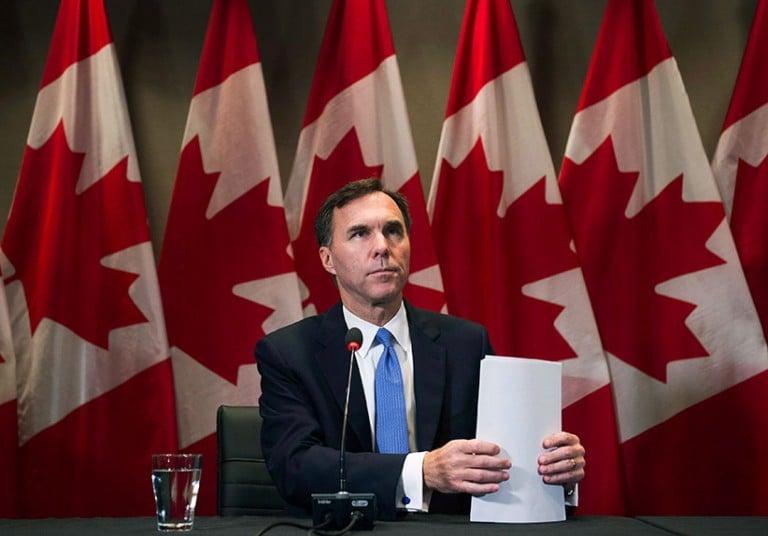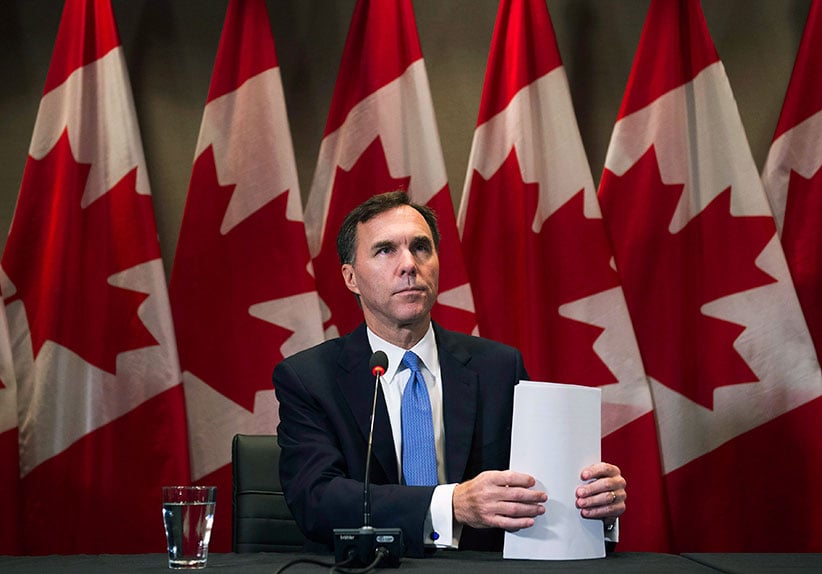The federal Liberals’ big problem with small business tax
From the editors: Morneau’s proposed changes to small business corporations will produce a tax code that is even more unfathomable than before

Finance Minister Bill Morneau makes an announcement on housing in Toronto Monday, October 3, 2016. The federal government has announced measures intended to stabilize the real estate sector amid concerns that pockets of risk have emerged in some housing markets, particularly those in Toronto and Vancouver. (Nathan Denette/CP)
Share

Occam’s Razor holds that the simplest coherent explanation is always preferable. The same should hold true for taxes. However a tax system is arranged, more than just a handful of tax lawyers and accountants should be able to understand it. And, by this standard, federal Finance Minister Bill Morneau’s controversial plan to change how incorporated small businesses are taxed fails miserably. The solution, however, is not to abandon the project, but to go much further.
The federal Liberals’ big problem with small businesses—doctors comprising their most vocal opponents—is the result of a tax system with inner workings that are mysteriously opaque. Every little change sets off a series of unintended consequences.
Consider that the origin of the doctors’ gripes partly lies in health care funding negotiations that saw some provinces bargain fee caps in exchange for allowing doctors to avail themselves of lucrative tax advantages, the costs of which were largely borne by the federal government. Then, when the Liberals raised the top personal tax rate to 33 per cent, they set off another round of aggressive tax planning among high income taxpayers. Now, to staunch the tax leakage and bolster their reputation as defenders of the middle class, the Liberals want to tighten small business tax rules, which will presumably impact future provincial health care funding negotiations.
READ: Throw another minister on the bonfire: the ballad of Bill Morneau
Morneau’s latest moves, however, will not lead to a simpler or fairer tax system. Changing the treatment of passive investments and dividends within small business corporations will produce a tax code that is even more complex and unfathomable than before. Morneau is heading in the entirely wrong direction. The goal should be to eliminate the motivation for aggressive tax planning by making the system simpler and more coherent, such that inventive tax lawyers are forced to seek employment elsewhere.
The last really comprehensive effort at this type of tax reform in Canada was during Brian Mulroney’s first term, when he slashed the number of personal tax brackets from 10 to three, cut the top rate dramatically and tightened up business exemptions. Later came the Goods and Services Tax, which shifted the personal tax system to a greater focus on consumption, which is fairer and easier to understand.
Since then, tax changes have been going backwards. The Harper government’s boutique tax credits offered special goodies to small slices of the electorate, such as volunteer firefighters or parents with kids in sports. This may have been good politics, but it was inefficient and unnecessarily complex. Prime Minister Justin Trudeau vowed to clean up the mess; and while he eliminated some tax credits, he added others. Then came a new high-income tax bracket. Now the Morneau plan promises another round of barnacles.
READ: How Bill Morneau found himself at war with small business
Canadians deeply engaged in the current small business debate should know tax reform is a hot topic in other countries as well, where the trend is towards aggressive simplification. Adopting the principle that taxes should be “easy to understand, simple to engage with, and hard to evade,” Britain earlier this year lowered its corporate tax rate and announced plans to go much further post-Brexit. U.S. President Donald Trump’s recent tax reform plan includes a cut in personal tax brackets from seven to four and a reduction in the large and small business corporate tax rate from 35 per cent to 20 per cent. While Trump may have trouble delivering on all his promises, the overall direction is clear. Canada ignores the worldwide trend towards tax simplicity at its peril.
Of course the knock against ambitious Mulroney-style tax reforms is the political obstacle they present. Threaten to gore too many sacred cows and a horde of special interest groups will make your life very miserable indeed.
Morneau’s small-shovel tax reform effort has already touched off an enormous outcry that threatens real damage to the Liberal brand. Would the political cost of going much further be any more onerous?
MORE ABOUT TAXES:
- Bring back the $10,000 TFSA
- Bill Morneau faces a backlash about tax breaks, not hurt feelings
- The Trudeau government’s policies reward dependence, not hard work
- The Liberals are sending dangerous signals to businesses and entrepreneurs
- Most Canadians are okay with doctors’ pay
- Showdown over Trudeau’s tax reforms could dominate fall sitting
- Bill Morneau needs to start taking tax fairness seriously
- Liberals aim to crack down on private corporate tax loopholes